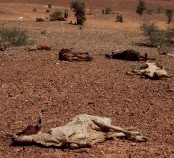|
afrol News, 23 January - The 2003 budget puts only small resources aside for Mauritania's famine victims and for the fight against poverty. While humanitarian agencies desperately send out appeals to be able to feed the drought victims, the Mauritanian government sets aside only 0.4 percent of GDP for this cause, "despite the availability of resources." According to a document made available by the International Monetary Fund (IMF) today, Fund representatives had discussed Mauritania's budget for 2003 with government members late last year. Discussions had, among other issues, been "focused on increasing social and poverty-related expenditures," the IMF reports. The Mauritanian government had agreed with the World Bank and the IMF to somewhat increase spending on health and education. However, "in view of the limited implementation capacity, it was not possible to increase social expenditures by more than 0.6 percentage point of GDP despite the availability of resources." The new budget in total leads to a "reduction (0.2 percent of GDP) in poverty-related expenditures in 2003." This reduction was essentially due to "the additional UM 1 billion (0.4 percent of GDP) allocated to drought-stricken rural areas in 2002." UM 1 billion translates to US$ 3.8 million or euro 3.5 million. Meanwhile, since June 2002, the World Food Programme (WFP) has warned about an emerging famine in Mauritania, estimating that almost 1 million out of the country's 2.7 million inhabitants were facing some degree of food insecurity. The UN agency on several occasions has had to disrupt its food distribution due to lack of donations. In 2003, WFP plans to spend almost US$ 30 million on 580,000 drought victims in the western Sahel, of which 420,000 are Mauritanians.
Since 1 September 2002, the Mauritanian government urgently has called for food donations. "Mauritania is facing alarming food shortages that could lead to mass starvation unless action is taken," a WFP official noted some months ago. Funding for the agency's emergency programmes in Mauritania is far from secured and food distribution has already had to be interrupted on several occasions in lack of funds. According to the IMF, any increase of Mauritanian funds to secure food distribution among its citizens or other means of reducing poverty cannot be expected. IMF and World Bank officials conclude that "weak implementation capacity continues to impede poverty reduction and a more significant improvement in social indicators." The Mauritanian public economy however was not to suffer significantly during this year, as a GDP growth of 5.5 percent was expected. However, assuming an "improved implementation capacity," the level of public savings was "expected to fall with the increase in social and poverty-related spending." Given this potential spending there was a "projected overall budget deficit at 2.3 percent of GDP." This was not to say that the government had no funds. The deficit would be "more than financed by external resources, leading to further accumulation of government deposits in the banking system," the IMF document says. Meanwhile, the IMF encouraged the Mauritanian government to go along with its planned tax reforms. The corporate tax rate was to be reduced from 25 to 20 percent this year, and taxes on private income were set to drop. Government was to spend an estimated 0.32 percent of GDP (slightly less than on the drought victims) to reduce "the heavy tax burden on wage earners" and businesses. This tax cut would of course "benefit the poor the most," the IMF and the government foresee. Drought victims and urban unemployed will be happy to see reduced taxes on their wages this year.
|
front page
| news
| countries
| archive
| currencies
| news alerts login
| about afrol News
| contact
| advertise
| español
©
afrol News.
Reproducing or buying afrol News' articles.
You can contact us at mail@afrol.com

